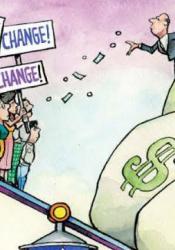The Great Resignation
The Great Resignation is a labor movement that began amidst the significant shift in the workforce during Covid in 2020, and continues to shake up the worker-employer status quo. Working from home, and shortly after, having millions of jobs be deemed “essential”, and thus allowed to have some workers go back to work despite covid-19 restrictions being mandated effectively, gave a new perspective to many workers at the time. “The Great Resignation” was coined by Texas A&M associate management professor Anthony Klotz during the pandemic. (Freed, Training) At first, many workers retained their job due to uncertainty facing the pandemic, but the flexibility and autonomy of remote work gave clarity to the questionable, and many workers realized they were not happy or comfortable with their current work situation.
Microsoft released a study in March 2022 which surveyed 31,000 people in 31 countries, that gave some insight into why workers are feeling burnout in today’s productivity focused environment: Flexible work hours showed an increase in productivity, despite companies calling employees back to work in lieu of public concern for covid declining. Leaders are deemed out of touch with their employees, and need a “wake up call”. (Spataro, Microsoft) High productivity is masking an exhausted workforce, and talent is everywhere in a hybrid-work environment world. 53% of people are now more likely to prioritize their health and well-being over work, and nearly 20% of respondents quit their jobs last year. (Kelly, Forbes) To combat the increased wage gap, increased unemployment rate, and the increased burnout of employees as a whole, the institution of a capitalistic society needs to be reexamined by its inhabitants. The 99% far outnumbers the 1, and acknowledging the power that workers have needs to be stated & restated in the current moment. D. Taylor, international president of the hotel and food service worker union Unite Here, told Vox: “The only fundamental way to change the economic livelihood and the rights of workers is through the union movement.” (Molla, Vox)
Workers are demanding that they be heard, if not through the usual means of worker-employer communications, then through quitting for greener pastures. By July 2021, over 4 million people had quit their jobs due to a variety of reasons, including declining work conditions, rising inflation, and government stimulus checks that allowed them to re-prioritize their work/life balance. (Kelly, Forbes) The highest reported reason for resigning in 2021 was from a toxic work culture. 31% of people who had resigned in 2021 stated that their reason was due to how they were treated by their bosses, the responsibilities that were thrust on them outside work, and the lack of improvement for their wages and benefits after years of service. (realestate) The increased wage divide between the 1% and the 99% is one of the largest issues in the contemporary moment (AFP, newindianexpress).
Related Links:
Don't Say Gay & Disney - This article showcases the sway and power that mega corporations like Disney have on our government. Without someone standing up against Disney & DeSantos, the voices of the minorities would likely not be heard. The Great Resignation has a similar idea, where people feel unheard and are quitting because of it.
The East Indian Rebellion of 1857 - An economic crisis spurred by the 1% in an attempt to keep their power over the natives of India. Sadly, this story had a sad ending as the colonizers ended up on top. I fear The Great Resignation could have a similar end if the masses are silenced and left content.
Work Cited:
AFP. "Billionaires added $4 trillion even as 100 million joined ranks of poor during Covid: Report". The New Indian Express. Dec 7, 2021. Retrieved from: https://www.newindianexpress.com/business/2021/dec/07/billionaires-added...
Dunaway-Seale, Jaime. "2022 Data: Toxic Company Culture is Fueling The Great Resignation". Real Estate Witch. Feb 21, 2022. Retrieved from: https://www.realestatewitch.com/great-resignation-2022/
Freed, J. E. Understanding ‘The Great Resignation’. TrainingMagazine. March 2022. v, 59 n. 1, p 102. Retrieved from: https://www.ulib.iupui.edu/cgi-bin/proxy.pl?url=https://search-ebscohost-com.proxy.ulib.uits.iu.edu/login.aspx?direct=true&db=crh&AN=155548125&site=ehost-live
Kelly, Jack. "Massive Microsoft Survey of 31,000 People to Vibe Check the Workplace Shows a Mismatch Between Managers and Employees". Forbes Careers. Mar 20, 2022. Retrieved from: https://www.forbes.com/sites/jackkelly/2022/03/20/massive-microsoft-surv...
Rosalsky, Greg. "The Great Resignation? More like The Great Renegotiation". npr Planet Money. Jan 25, 2022. Retrieved from: https://www.npr.org/sections/money/2022/01/25/1075115539/the-great-resig...
Spataro, Jared. ‘Great expectations: A road map for making hybrid work work’. Microsoft. March 2022. Retrieved from: https://blogs.microsoft.com/blog/2022/03/16/great-expectations-a-roadmap-for-making-hybrid-work-work/
Zeddies, Lino. 'Money creation and Inequality - An Underexposed Topic for Monetary Reformers'. International Movement for Monetary Reform. Jan 6 2018. Retrieved from: https://internationalmoneyreform.org/news/2018/01/money-creation-inequal...

